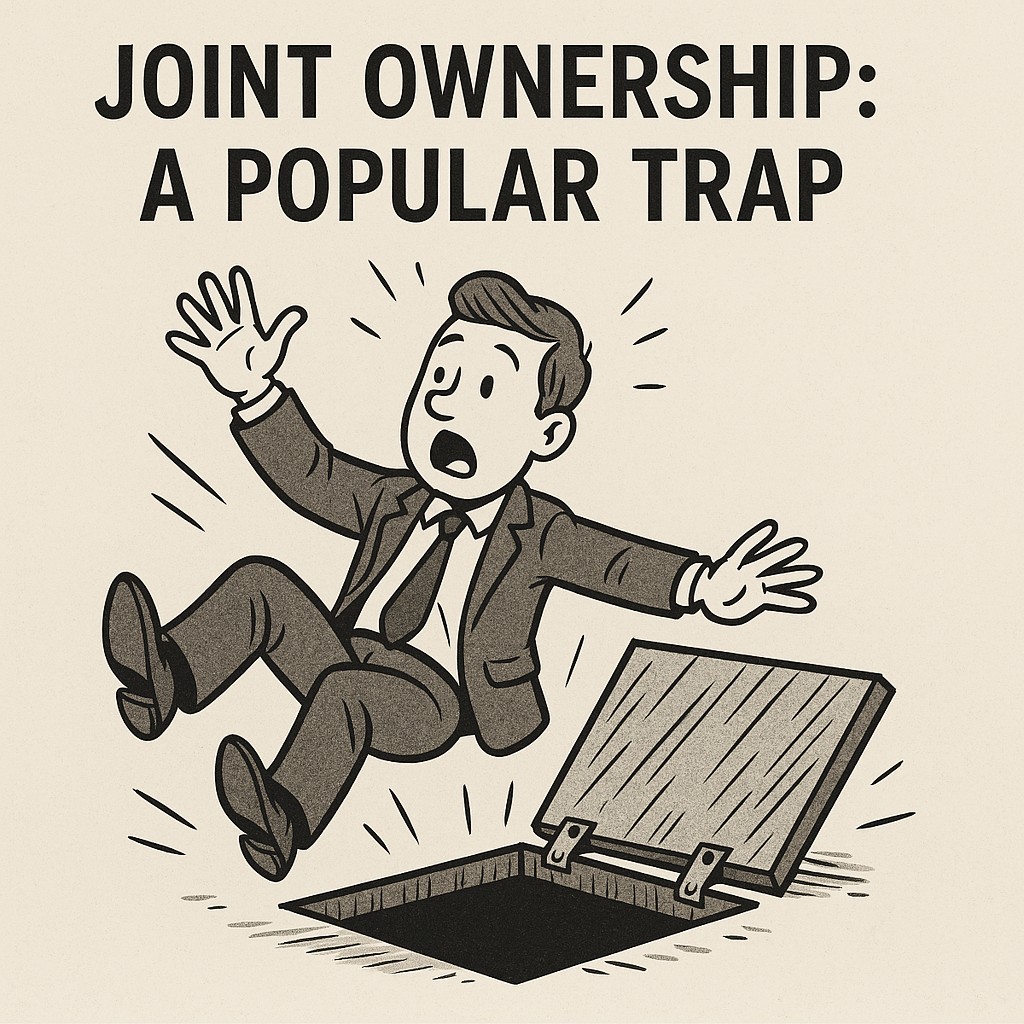Joint Ownership: A Popular Trap in Naperville, Illinois Estate Planning
Joint ownership is a widely-used strategy in Naperville, Illinois and elsewhere, often viewed as a simple solution to avoid probate and easily transfer property to loved ones. While seemingly straightforward, joint ownership carries significant risks and unintended consequences that can undermine your overall estate plan. There are serious problems with joint ownership.
Understanding the implications of joint ownership is essential to protect your estate and ensure your wishes are honored.
What Is Joint Ownership?
Joint ownership occurs when two or more people share legal rights to an asset. In Illinois, common forms include:
- Joint Tenancy with Right of Survivorship: Assets automatically pass to surviving owners upon death.
- Tenancy by the Entirety: Exclusive to married couples in Illinois, offering creditor protections.
- Joint Bank Accounts: Provide equal access to funds, regardless of individual contributions.
While these options might seem straightforward, they can lead to unforeseen financial, legal, and estate planning issues.
Risks of Joint Ownership in Naperville Estate Planning
1. Loss of Control Over Assets
When you add someone as a joint owner, you lose full control over decisions such as selling or refinancing a property. For example, adding your adult child as a joint owner of your Naperville home means you cannot act without their consent, potentially causing family disputes.
2. Exposure to Co-Owner’s Debts and Legal Issues
Any liabilities or debts of joint owners can threaten your own assets. If the co-owner has financial troubles or faces legal judgments, your property could be at risk. In Illinois, this risk is particularly relevant if the co-owner experiences financial instability or legal difficulties.
3. Unexpected Tax Consequences
Joint ownership can lead to significant tax implications, such as:
- Capital Gains Taxes: Selling jointly-owned assets could result in increased capital gains taxes.
- Loss of Step-up in Basis: Beneficiaries might lose the beneficial tax step-up that reduces capital gains taxes upon inheritance, creating unforeseen tax burdens.
Proper estate planning helps minimize these unintended tax liabilities.
4. Probate Avoidance May Not Work as Intended
Many residents of Naperville opt for joint ownership to avoid probate, but this tactic can inadvertently disinherit intended beneficiaries. If a surviving joint owner differs from your chosen heirs, your assets may not pass according to your estate plan.
Clearly, there are problems with joint ownership.
When Might Joint Ownership Be Appropriate?
That said, in some scenarios, joint ownership may be practical—particularly if you completely trust the co-owner and wish them to inherit assets directly. Still, these situations are limited and should always be evaluated carefully by an estate planning professional.
Secure Your Estate with Professional Guidance
Joint ownership might seem straightforward, but it comes with hidden risks. Effective estate planning requires careful consideration of potential legal, financial, and tax implications specific to Illinois.
At the Law Offices of Robert J. Varak in Naperville, we specialize in helping families navigate estate planning complexities. We offer clear guidance from a Naperville estate planning attorney to create tailored strategies to protect your assets and honor your inheritance goals.
Schedule your consultation today to discuss safer, more effective estate planning alternatives.
Key Takeaways:
- There are problems with joint ownership
- Joint ownership can limit your control over essential asset decisions.
- It exposes you to the financial liabilities of your co-owners.
- Can create unintended capital gains taxes and other tax issues.
- May disrupt the intended distribution outlined in your estate plan.
- Better options, like trusts, often provide more security and flexibility.



